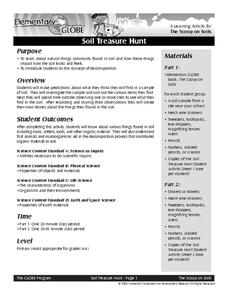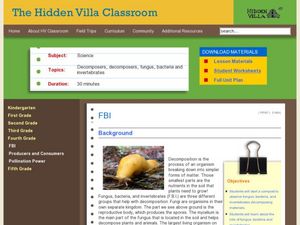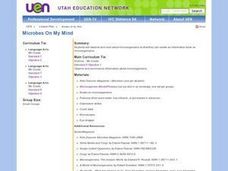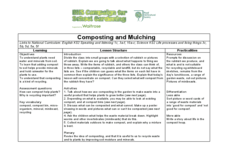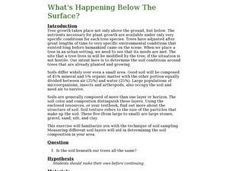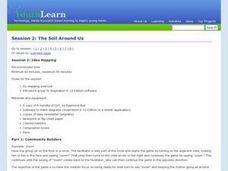Science Matters
Mighty Microorganisms
How can you tell if a microorganism is helpful or detrimental to an ecosystem? Learners inspect slides or pictures of microorganisms and record their observations to identify those that are beneficial or harmful. They then pretend to...
Growing Classroom
Space Travelers
Groups of three scientists from the rocky planet Zog investigate the composition of soil so that they can take the information back to their home, create soil there, and begin to grow food.
Curated OER
Soil Treasure Hunt
Students explore the concept of soil and decomposition. In this soil and decomposition lesson, students investigate bags of soil. Students then learn how animals and other organisms help in the decomposition process.
Curated OER
Soil Composition
Students examine soil. In this soil composition lesson students participate in soil sedimentation and filtration activities. The students discuss what non-living and living things are in soil and why it is so important.
Science Matters
Crawly Composters
Get your hands dirty with an interactive lesson that showcases the process of decomposing and returning nutrients back into the soil. After building a compost pile, pupils regularly observe the ways worms help with changes to the soil...
Curated OER
Microorganisms: Good Guys or Bad Guys?
Students discover the role microorganisms play in our lives. In this decomposition instructional activity, students examine decaying foods and plants in order to analyze the different bacteria that grows. Students discuss the good and...
Curated OER
Optional Laboratory: Comparing Soil Temperatures In Sun and Shade
Young scholars work together to test the temperatures of different soils in shade and sun. They make their own hypothesis before beginning the experiment. They record their data and discuss as a class.
Curated OER
Optional Laboratory: Soil Particle Size and Texture
Students work together to perform experiments on different types of soil. They record the soil's pH level, color and texture. They develop hypothesis' on what they believe they will discover before beginning the experiment.
Curated OER
FBI
Fourth graders experiment with compost. In this Science lesson, 4th graders begin a worm compost as well as an outdoor compost. Students discuss decomposition.
Curated OER
Microbes on My Mind
Students observe and read about microorganisms so that they can create an information book on microorganisms.
Captain Planet Foundation
Worm Your Way Out of This
How can you provide healthy soil for your garden? Study worms, bacteria, and other microorganisms in a lesson about decomposition and organic compost. After discussing what you know about worms and watching a video, watch what worms do...
Curated OER
The Marvels of Mud
Young scientists roll up their sleeves and get a little dirty in this three-day earth science investigation. Following the scientific method, children monitor the growth of algae in pond water samples in order to determine the role that...
Curated OER
Composting and Mulching
Second graders define composting and recognize what can be composted. In this composting and mulching lesson, 2nd graders classify objects or pictures as good or bad for composting. Students write a story about life in the compost heap.
Curated OER
Water Filtration
As an example of nature's water filtering system, young ecologists conduct an experiment in the lab. They construct a funnel out of a plastic bottle, fill it with specified layers of materials that simulate layers of soil, then run muddy...
California Academy of Science
Composting: A Scientific Investigation: California Academy of Sciences
Garbage, recycle, compost: Does it really matter where we put our trash once we are done? By making detailed observations over seven weeks, kids will see which materials break down naturally to become a healthy part of the soil, and...
Curated OER
Spud Smear
Students study various samples of microorganisms in petri dishes. In this microorganism lesson, students place various samples of items in petri dishes and observe them after several days of incubation.
Curated OER
What's Happening Below The Surface?
High schoolers determine the soil composition of soil layers in their area. They collect soil samples, calculate the percentage soil water content, analyze data, and evaluate each site for future tree growth.
Curated OER
Winogradsky in a Bottle: Beginning a Winogradsky Column
Students use their measurement skills by marking a bottle for construction purposes. They record qualitative and quantitative data and analyze their results. Students demonstrate evaluation of a small scale systems as a model for the...
Curated OER
Reading the River
In collaborative groups, young ecologists measure the temperature, pH, and dissolved oxygen for three different freshwater samples. They examine each sample with a microscope and record observations on the microorganisms in the pond...
Curated OER
Discovery Science Center Activities
Fourth graders complete a variety of experiments to meet science goals. In this life sciences lesson, 4th graders make yogurt, discover the attraction of opposite charges in electricity, learn the effects of glaciers, and explore...
Curated OER
Health: Food Borne Illnesses
Students discover how to inhibit food borne illnesses by practicing safe food-handling techniques. Among topics they examine are the advantages and disadvantages of using wooden or plastic cutting boards. After studying for the test,...
Curated OER
Mini-Ponds
In this mini pond worksheet, students create a mini-pond ecosystem with soil, water, and plant life. Students let their ecosystem sit for a day and they observe a sample the next day. Students identify all the pond water microorganisms...
Teach Engineering
Biological Processes: Putting Microbes to Work
Is there such a thing as useful microbes? Get ready to perform experiments on applying microbes for wastewater treatment. The first installment of the three-part unit provides background information to prepare young engineers for two...
Curated OER
Idea Mapping
Students generate, share and display ideas as a group. They break into small groups to work on hand-drawn maps made up of concentric circles. they come before the group and make a similar diagram by charting each other's characteristics.




